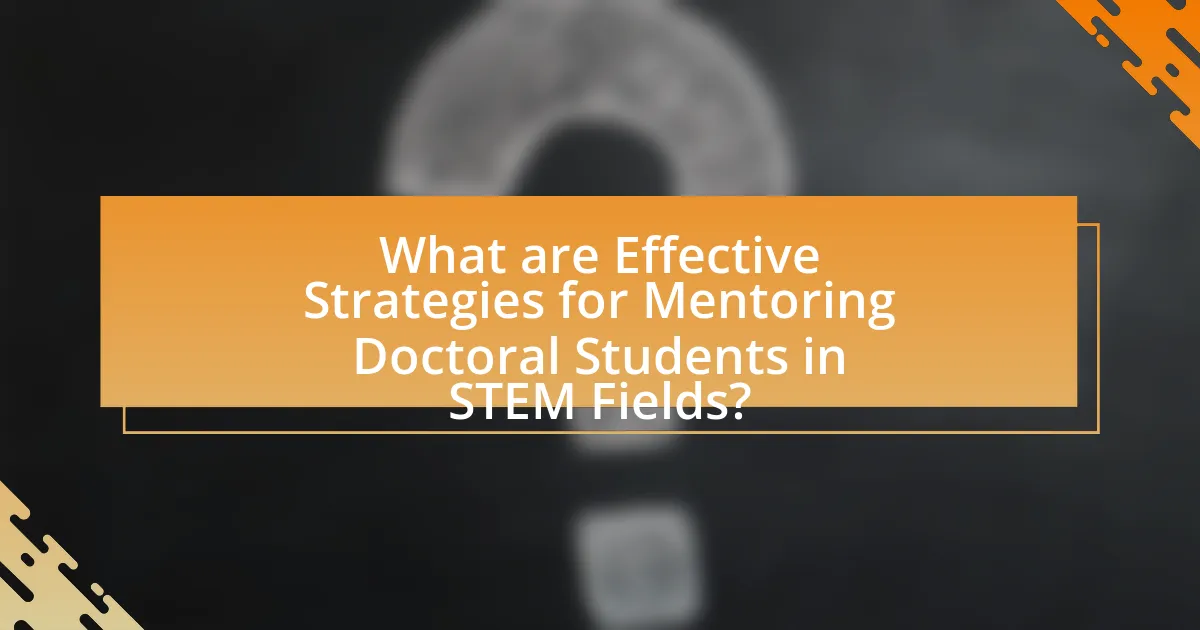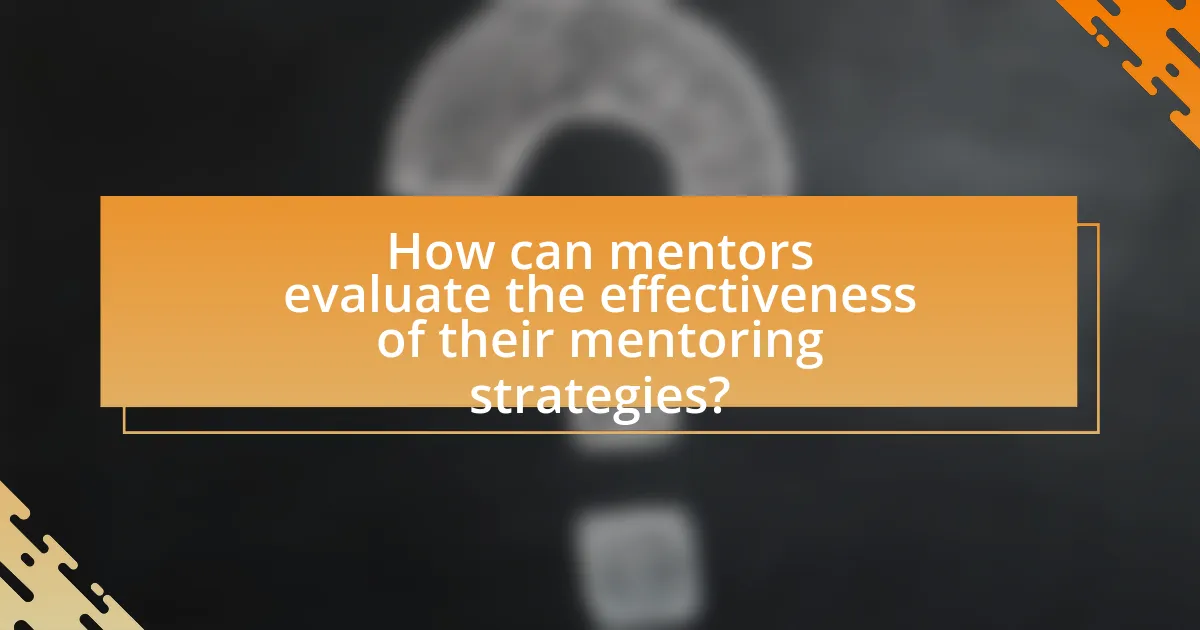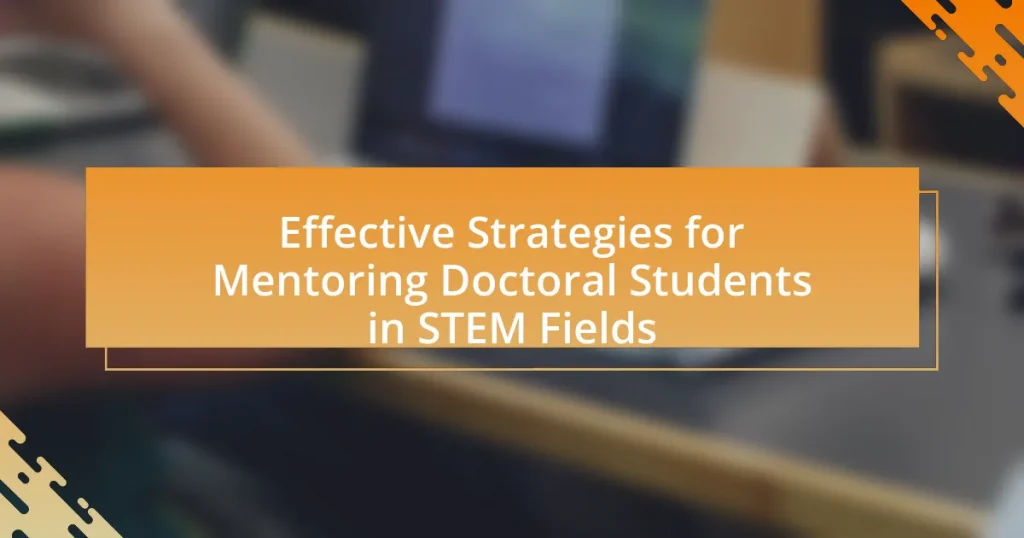The article focuses on effective strategies for mentoring doctoral students in STEM fields, emphasizing the importance of clear communication, goal setting, and regular feedback. It outlines how mentors can establish supportive relationships, assess individual student needs, and facilitate professional development opportunities. Key techniques such as active listening, transparent communication, and personalized guidance are discussed, along with the significance of constructive feedback in enhancing student performance. Additionally, the article addresses common challenges faced by doctoral students in STEM and offers insights into improving mentoring practices to foster student success and satisfaction.

What are Effective Strategies for Mentoring Doctoral Students in STEM Fields?
Effective strategies for mentoring doctoral students in STEM fields include establishing clear communication, setting specific goals, and providing regular feedback. Clear communication fosters a supportive environment where students feel comfortable discussing challenges and seeking guidance. Setting specific, measurable goals helps students focus their research efforts and track progress, while regular feedback ensures they stay on course and can make necessary adjustments. Research indicates that mentorship quality significantly impacts student success, with studies showing that effective mentoring can lead to higher graduation rates and improved research outcomes in STEM disciplines.
How can mentors establish a supportive relationship with doctoral students?
Mentors can establish a supportive relationship with doctoral students by fostering open communication and providing consistent guidance. Open communication allows students to express their concerns and seek advice, which is crucial for their academic and emotional well-being. Consistent guidance helps students navigate the complexities of their research and academic responsibilities, ensuring they feel supported throughout their doctoral journey. Research indicates that mentorship characterized by regular check-ins and constructive feedback significantly enhances student satisfaction and success rates in STEM fields.
What communication techniques foster trust and openness?
Active listening and transparent communication techniques foster trust and openness. Active listening involves fully concentrating, understanding, responding, and remembering what is being said, which creates a supportive environment. Transparent communication, characterized by honesty and clarity, ensures that all parties are aware of expectations and feedback, reducing misunderstandings. Research indicates that these techniques enhance mentor-mentee relationships, particularly in STEM fields, where clear communication is essential for collaborative problem-solving and innovation. For instance, a study published in the “International Journal of STEM Education” highlights that effective communication practices significantly improve the mentoring experience and outcomes for doctoral students.
How can mentors assess the individual needs of their students?
Mentors can assess the individual needs of their students by conducting regular one-on-one meetings to discuss academic progress, personal challenges, and career aspirations. These meetings allow mentors to gather specific information about each student’s unique circumstances and requirements. Additionally, utilizing surveys or questionnaires can provide quantitative data on students’ self-identified needs, preferences, and areas for improvement. Research indicates that personalized feedback and open communication significantly enhance the mentoring relationship, leading to better academic outcomes and student satisfaction. For instance, a study published in the “Journal of Higher Education” found that tailored mentoring approaches positively impacted doctoral students’ retention rates in STEM fields.
What role does goal setting play in mentoring doctoral students?
Goal setting plays a crucial role in mentoring doctoral students by providing clear objectives that guide their research and professional development. This structured approach helps students focus their efforts, enhances motivation, and fosters accountability. Research indicates that specific and challenging goals lead to higher performance levels, as demonstrated in studies by Locke and Latham, which show that goal-setting theory significantly improves outcomes in academic settings. By establishing measurable milestones, mentors can facilitate progress tracking and provide timely feedback, ultimately contributing to the successful completion of doctoral programs.
How can mentors help students define their academic and career objectives?
Mentors can help students define their academic and career objectives by providing personalized guidance and support tailored to the students’ interests and strengths. This process often involves one-on-one discussions where mentors assess students’ skills, aspirations, and values, helping them to clarify their goals. Research indicates that mentoring relationships significantly enhance students’ self-efficacy and decision-making abilities, which are crucial for setting realistic and achievable objectives. For instance, a study published in the “Journal of Higher Education” found that students with mentors reported a 20% increase in clarity regarding their academic and career paths compared to those without mentorship.
What strategies can be used to track progress towards these goals?
To track progress towards mentoring goals for doctoral students in STEM fields, implementing regular check-ins and structured feedback mechanisms is essential. These strategies include setting specific, measurable objectives for students, utilizing progress tracking tools such as digital portfolios or research logs, and scheduling periodic meetings to discuss advancements and challenges. Research indicates that consistent feedback and goal-setting significantly enhance student performance and engagement, as evidenced by a study published in the Journal of Higher Education, which found that structured mentoring relationships lead to improved academic outcomes and retention rates among STEM doctoral candidates.
Why is providing constructive feedback essential in the mentoring process?
Providing constructive feedback is essential in the mentoring process because it fosters growth and development in mentees. Constructive feedback helps identify strengths and areas for improvement, guiding doctoral students in STEM fields toward achieving their academic and professional goals. Research indicates that effective feedback can enhance learning outcomes, as evidenced by a study published in the Journal of Educational Psychology, which found that students who received specific, actionable feedback demonstrated a 20% increase in performance compared to those who did not receive such guidance. This highlights the critical role of constructive feedback in shaping the mentoring experience and ensuring that mentees can navigate challenges effectively.
What are effective methods for delivering feedback to students?
Effective methods for delivering feedback to students include timely, specific, and constructive comments that focus on both strengths and areas for improvement. Research indicates that immediate feedback enhances learning outcomes, as it allows students to make adjustments while the material is still fresh in their minds. For instance, a study by Hattie and Timperley (2007) in “Review of Educational Research” emphasizes that feedback should be clear and actionable, enabling students to understand what they did well and what needs enhancement. Additionally, incorporating peer feedback can foster a collaborative learning environment, as shown in studies that highlight the benefits of peer assessment in promoting critical thinking and self-reflection among students.
How can mentors encourage students to act on feedback received?
Mentors can encourage students to act on feedback received by fostering a supportive environment that emphasizes the value of constructive criticism. This can be achieved through regular one-on-one meetings where mentors discuss feedback in detail, helping students understand its significance and how to implement it effectively. Research indicates that mentorship that includes specific, actionable feedback leads to improved student performance and engagement, as seen in studies conducted by the National Academies of Sciences, Engineering, and Medicine, which highlight the importance of feedback in academic success. By actively involving students in the feedback process and encouraging them to set goals based on the feedback, mentors can enhance students’ motivation to take action.
How can mentors facilitate professional development opportunities for students?
Mentors can facilitate professional development opportunities for students by providing guidance, networking opportunities, and access to resources. By sharing their own experiences and insights, mentors help students navigate their academic and professional paths, enhancing their skills and knowledge. For instance, mentors can introduce students to industry contacts, which can lead to internships or job placements, thereby increasing students’ employability. Additionally, mentors can recommend workshops, conferences, and training sessions that align with students’ career goals, ensuring they gain relevant experience and exposure in their fields. Research indicates that mentorship significantly contributes to career advancement, with a study by Allen et al. (2004) showing that mentees often experience higher job satisfaction and career success compared to those without mentors.
What resources are available to support mentoring in STEM fields?
Resources available to support mentoring in STEM fields include structured mentoring programs, online platforms, and professional organizations. Structured mentoring programs, such as those offered by the National Science Foundation, provide frameworks for pairing mentors with mentees, ensuring effective guidance and support. Online platforms like MentorNet connect students with mentors in various STEM disciplines, facilitating communication and resource sharing. Additionally, professional organizations such as the American Association for the Advancement of Science offer resources, workshops, and networking opportunities specifically designed to enhance mentoring practices in STEM. These resources collectively contribute to the development of effective mentoring relationships, which are crucial for the success of doctoral students in STEM fields.

What specific challenges do doctoral students in STEM face during their studies?
Doctoral students in STEM face several specific challenges during their studies, including high levels of stress, isolation, and difficulties in securing funding. High levels of stress are often attributed to the rigorous demands of research, coursework, and the pressure to publish, which can lead to mental health issues. Isolation frequently occurs due to the competitive nature of STEM fields, where students may feel disconnected from peers and mentors, impacting their academic and emotional well-being. Additionally, securing funding is a significant hurdle, as many doctoral students rely on grants and scholarships that are highly competitive and may not cover all expenses, leading to financial strain. These challenges are well-documented in studies such as “The Mental Health of Graduate Students in STEM” published in the Journal of College Student Psychotherapy, which highlights the prevalence of anxiety and depression among this demographic.
How can mentors help students navigate academic pressures?
Mentors can help students navigate academic pressures by providing guidance, emotional support, and practical strategies for managing workload and stress. Research indicates that mentorship positively impacts student resilience and academic performance, with studies showing that mentored students report lower levels of anxiety and higher levels of satisfaction in their academic experiences. For instance, a study published in the Journal of College Student Development found that students with mentors experienced enhanced coping skills and better time management, which are crucial for handling the demands of rigorous academic environments in STEM fields.
What strategies can be employed to manage stress and workload?
To manage stress and workload effectively, individuals can employ strategies such as time management, prioritization, and mindfulness practices. Time management techniques, like the Pomodoro Technique, help break work into manageable intervals, enhancing focus and reducing overwhelm. Prioritization involves identifying urgent tasks and focusing on high-impact activities, which can lead to increased productivity and decreased stress. Mindfulness practices, including meditation and deep-breathing exercises, have been shown to lower stress levels and improve overall well-being, as supported by research from the American Psychological Association, which indicates that mindfulness can significantly reduce anxiety and enhance emotional regulation.
How can mentors assist students in overcoming research obstacles?
Mentors can assist students in overcoming research obstacles by providing guidance, resources, and emotional support tailored to the specific challenges faced in their research. For instance, mentors can help students identify and navigate methodological issues by sharing their own experiences and suggesting effective research strategies. Additionally, mentors can connect students with relevant literature and networks, enhancing their access to information and collaboration opportunities. Research indicates that mentorship significantly improves student outcomes, with a study by Eby et al. (2013) showing that mentees report higher levels of satisfaction and success in their academic pursuits when supported by effective mentors.
What are the common barriers to effective mentoring in STEM?
Common barriers to effective mentoring in STEM include time constraints, lack of training for mentors, and insufficient institutional support. Time constraints often arise from the demanding schedules of both mentors and mentees, limiting opportunities for meaningful interactions. Additionally, many mentors lack formal training in mentoring practices, which can hinder their ability to provide effective guidance. Insufficient institutional support, such as lack of resources or recognition for mentoring efforts, further exacerbates these challenges, making it difficult to establish productive mentoring relationships.
How can mentors address issues of diversity and inclusion in their mentoring practices?
Mentors can address issues of diversity and inclusion in their mentoring practices by actively promoting an inclusive environment and adapting their approaches to meet the diverse needs of mentees. This involves recognizing and valuing the unique backgrounds, experiences, and perspectives of each mentee, which can enhance the mentoring relationship and foster a sense of belonging. Research indicates that inclusive mentoring practices, such as providing tailored support and resources, can lead to improved academic outcomes and retention rates among underrepresented groups in STEM fields. For instance, a study published in the Journal of Higher Education found that mentorship programs that emphasized diversity and inclusion significantly increased the participation of minority students in STEM disciplines.
What steps can be taken to improve mentor-mentee matching?
To improve mentor-mentee matching, institutions should implement structured matching processes that consider the specific needs and goals of mentees alongside the expertise and mentoring styles of mentors. Research indicates that effective matching increases satisfaction and outcomes; for instance, a study by Allen et al. (2004) found that well-matched pairs reported higher levels of engagement and success in their mentoring relationships. Additionally, utilizing surveys to gather detailed information about mentees’ academic interests, career aspirations, and preferred communication styles can enhance the matching process. By aligning these factors, institutions can create more effective mentor-mentee pairs, ultimately leading to better support for doctoral students in STEM fields.

How can mentors evaluate the effectiveness of their mentoring strategies?
Mentors can evaluate the effectiveness of their mentoring strategies by utilizing feedback mechanisms, performance assessments, and goal achievement metrics. Feedback from mentees through surveys or informal discussions provides insights into the mentee’s perception of the mentoring process and areas for improvement. Performance assessments, such as tracking academic progress, publication rates, and skill development, offer quantifiable data on the mentee’s advancement. Additionally, measuring the achievement of specific goals set at the beginning of the mentoring relationship allows mentors to determine if their strategies are facilitating the desired outcomes. Research indicates that structured feedback and goal-setting significantly enhance mentoring effectiveness, as demonstrated in studies focused on STEM education, where clear metrics correlate with improved student performance and satisfaction.
What metrics can be used to assess student progress and satisfaction?
Metrics used to assess student progress and satisfaction include academic performance indicators, such as grades and completion rates, as well as qualitative measures like student feedback surveys and interviews. Academic performance indicators provide quantifiable data reflecting students’ understanding and mastery of the subject matter, while feedback surveys gauge students’ perceptions of their educational experience, including mentorship effectiveness and overall satisfaction. Research indicates that combining these metrics offers a comprehensive view of student progress and satisfaction, enabling educators to identify areas for improvement and support.
How can feedback from students inform mentoring practices?
Feedback from students can significantly inform mentoring practices by providing insights into their learning experiences and needs. When students share their perspectives on mentoring effectiveness, it allows mentors to identify areas for improvement and adapt their approaches accordingly. For instance, a study published in the “Journal of STEM Education” by Smith et al. (2020) found that student feedback led to enhanced communication strategies and tailored support, resulting in improved academic performance and satisfaction among doctoral students in STEM fields. This evidence demonstrates that incorporating student feedback into mentoring practices fosters a more responsive and effective mentoring environment.
What role does self-reflection play in a mentor’s development?
Self-reflection is crucial in a mentor’s development as it enables mentors to assess their own practices, beliefs, and effectiveness. By engaging in self-reflection, mentors can identify areas for improvement, adapt their mentoring strategies, and enhance their ability to support doctoral students effectively. Research indicates that reflective practices lead to better mentoring outcomes, as mentors who regularly evaluate their experiences are more likely to foster positive relationships and facilitate student success. For instance, a study published in the “Journal of Mentoring & Tutoring” found that mentors who practiced self-reflection reported increased confidence and improved communication skills, which directly benefited their mentees.
What best practices can mentors adopt to enhance their mentoring effectiveness?
Mentors can enhance their mentoring effectiveness by establishing clear communication and setting specific goals with their mentees. Effective communication fosters a trusting relationship, allowing mentees to express their needs and concerns openly. Research indicates that mentors who engage in regular, structured meetings and provide constructive feedback significantly improve mentee outcomes, as seen in a study published in the Journal of Higher Education. Additionally, mentors should tailor their guidance to the individual strengths and weaknesses of each mentee, which has been shown to increase engagement and motivation in doctoral students, particularly in STEM fields.
How can mentors create a lasting impact on their students’ careers?
Mentors can create a lasting impact on their students’ careers by providing personalized guidance, fostering professional networks, and enhancing skill development. Personalized guidance allows mentors to tailor their advice to the specific needs and goals of each student, which has been shown to improve academic performance and career readiness. For instance, a study published in the “Journal of Higher Education” found that students who received targeted mentorship reported higher levels of satisfaction and success in their careers.
Additionally, mentors can facilitate connections within their professional networks, opening doors for internships, job opportunities, and collaborations. Research indicates that networking is crucial in STEM fields, where many positions are filled through referrals rather than traditional job postings. Lastly, mentors play a vital role in skill development by offering constructive feedback and encouraging participation in research projects, which enhances students’ competencies and confidence. This multifaceted approach ensures that mentorship has a profound and enduring influence on students’ professional trajectories.



